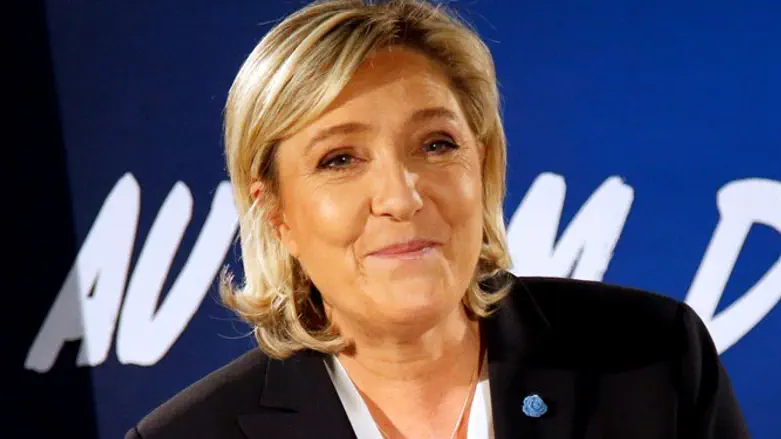
The National Front’s Marine Le Pen and former Economy Minister Emmanuel Macron led polls going into election day Sunday, as France’s 47 million eligible voters choose which two candidates will proceed to a run-off election scheduled for May 7th.
A total of 11 candidates are on the ballot in Sunday’s vote, but polls show only 4 have a reasonable chance of proceeding to the run-off election.
Recent polling shows the nationalist Le Pen, an outspoken opponent of French membership in the European Union who has called to significantly reduce Muslim immigration into France, effectively tied with Macron, a former member of the Socialist Party who now heads En Marche!, a Third Way party branded as a centrist alternative to the incumbent President Francois Hollande and Le Pen.
In a recent Odoxa poll, Le Pen was projected to win 23% of the vote in the first round, compared to 24.5% for Macron.
But Francois Fillon of the center-right Republicans and Jean-Luc Melenchon of the far-left Unsubmissive France were close enough to cause concern for both Macron and Le Pen, raising the possibility that one of the current front-runners may not make it to the run-off.
The Odoxa poll gave Fillon 19% of the vote, compared to 19.5% to Melenchon, placing them both within single digits of Le Pen and Macron.
If he does make it to the second round, Macron would likely defeat any of his potential opponents, polls show. According to the Odoxa survey, Macron would carry at least 60% of the vote in a run-off election against any of his three most likely opponents.
But Le Pen’s National Front party is hoping for a “shy Tory” effect – whereby supporters for a candidate marginalized by the media are reluctant to reveal their voting preference to pollsters.
Le Pen has built a strong base of support not only among traditional Catholics and anti-immigration advocates, but also among blue collar workers in industrial towns affected by the European Union’s environmental and trade policies.
While her father, Jean-Marie Le Pen, founder of the National Front, was considered a marginal figure in French politics, Le Pen has capitalized on growing anxiety across Europe over the rise of Islamic terrorism and the failure of many French Muslims to assimilate into French society. Le Pen also distanced herself – and the party – from the most controversial aspects of her father’s political legacy, including his comments on the Holocaust, which some claimed bordered on outright denial.
Nevertheless, some of Marine Le Pen’s positions have worried French Jews, who fear they could be harmed by the National Front’s stated goal of preserving French national culture.
In February, Le Pen pledged to bar French citizens from holding dual citizenship with non-European countries; a move that could affect tens of thousands of Israeli-French Jews in Israel and in France.
“Israel is not a European country and doesn’t consider itself as such,” Le Pen told France 2 TV.
“I’m asking the Israelis to choose their nationality. It doesn’t mean that if they don’t choose French nationality they have to leave. France can certainly accommodate foreign people on its soil long-term… as long as they respect French laws and French values, which is often a problem on the immigration issue. It’s really not a problem with Israel on this topic,” she continued.
Later, Le Pen appeared to backtrack, saying she was not firmly committed to the policy.
“I’m not locked into abolishing dual citizenship,” said Le Pen.
A ban on religious apparel in public, barring both the Muslim burka and Jewish kippah, also drew outcries from French Jews, who said the move would constitute a significant infringement on their right to religious expression.
Le Pen insisted the goal of the policy, however, was to combat radical Islam, not antagonize France’s Jewish population.
On the left, Melenchon, a former member of the French Communist Party and founder of the Unsubmissive France movement, has stirred even greater concerns among French Jews, who noted his open hostility towards Israel and apparent distaste and even xenophobia towards French Jewish supporters of the Jewish state.
Even many left-wing Jews in France have expressed anxiety over the prospect of a Melenchon presidency.
“I don’t see any significant difference between Melenchon and the National Front on many issues,” said Joann Sfar, a well-known French-Jewish novelist and filmmaker who used to support communist causes. Both are “surrounded by Germanophobes, nationalists and France-firsters.”
Melenchon has called for a total boycott of Israel, and has likened Israel’s liberation of Jerusalem, Judea, and Samaria to “bank robbers”.
During the 2014 conflict between Israel and the Hamas terror organization, Melenchon praised anti-Israel protesters, making no effort to condemn or even acknowledge the rash of anti-Semitic incidents and attacks that accompanied the demonstrations.
“I want to congratulate the youth of my country who mobilized in defense of the miserable victims of war crimes in Gaza,” Melenchon said in a 2014 speech. “They did so with model discipline when they were pushed to extremes on all sides. They knew how to remain dignified and embodied better than anyone the founding values of the French republic.”
While few political prognosticators perceived Melenchon as a strongly competitive candidate during most of the campaign, his surge in late March and April could be the sign of a potential upset in the offing.
Should he proceed to the second round of voting in May, polls predict Melenchon would defeat either Marine Le Pen or Francois Fillon – albeit by relatively narrow margins – but lose to Macron.
But with polls showing 25% of the electorate undecided on the eve of the election and unexpectedly high turnout, nothing about the outcome of this year’s vote appears certain.
